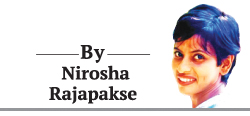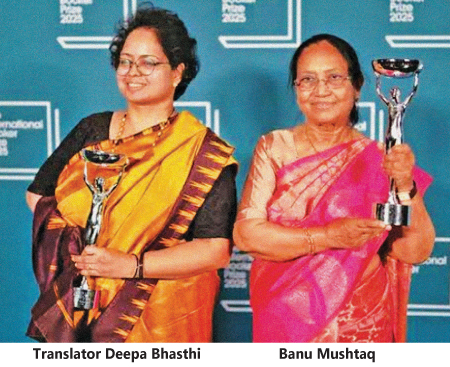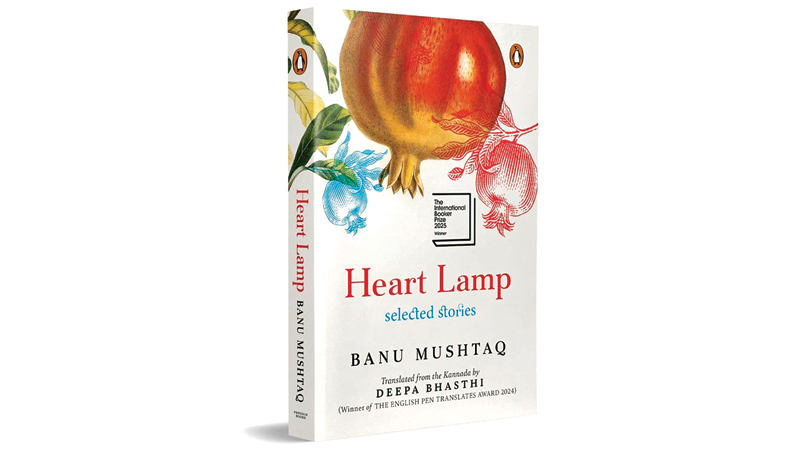 Sub-continental literature has often been such a remarkably striking phenomenon; its unique identity never fades away. A woman from the subcontinent made news headlines over the past couple of weeks with her “Heart Lamp”.
Sub-continental literature has often been such a remarkably striking phenomenon; its unique identity never fades away. A woman from the subcontinent made news headlines over the past couple of weeks with her “Heart Lamp”.
This woman is none other than Banu Mushtaq, and her short story collection “Heart Lamp” won the 2025 International Booker Prize. Spotlight was equally on Mushtaq and her translator Deepa Bhasthi over their remarkable narrative that stole the hearts of the panel of judges of the international Booker Prize.
Enshrined within “Heart Lamp” are the dreadful and miserable stories about women in some communities in Southern India whose lives have become desperate and dejected due to the dark shadows of much debated caste systems, male-dominated structures and religious oppression.
“Heart Lamp” being awarded with the prestigious Booker Prize was a watershed moment for literature in general and its translations in the subcontinent. A critic notes that the book is injected with an enormous appeal of bringing out a compelling and convincing representation of the sordid lifestyle of the vilified and diminished women, notably in some parts of India in a captivating way that reverberates with the reading public on a profoundly moving level.
Radical approach
The translator has taken a rather radical approach with her work, and that makes her distinctively different from the community of general translators. The translator has effortlessly retained the spirit of “Kannada” of the original text that furnishes a new outlook about how literature, evolving from around the world, could be presented in English.
 The author Mushtaq seems to have been moved by the colloquial language in her storytelling; being flanked by colloquialism, she makes her characters bonafide and understandable. The social context that runs across her stories becomes handy and appealing. The abyss and the sense of realism added into the story are tremendous.
The author Mushtaq seems to have been moved by the colloquial language in her storytelling; being flanked by colloquialism, she makes her characters bonafide and understandable. The social context that runs across her stories becomes handy and appealing. The abyss and the sense of realism added into the story are tremendous.
Mushtaq’s writing has its own unique identity that employs a lavish spoken style; it fuels intense and glowing emotional heights. As The Reading Agency notes, it brings out innovative touch in a plurality of Englishers. Using incisive an illustrative language that is rich in its required humorous disposition in writing is Mushtaq’s forte. Her writing style amicably settles in daily language conversations whilst giving life to powerful heart-rending responses. Mushtaq herself is a classic example that highlights the fact that embodying and embracing the cultural subtleties and particularities into the art of storytelling is an element that has a tremendous significance. The intrinsic knack that Mushtaq cultivates in her piece of writing gets to grips with demanding and exigent themes with susceptibility, where it makes room for readers to study the crucial topics without being astounded.
Right throughout her endurance in writing, Mushtaq is determined to demonstrate the fact that her narratives depict the wily and artful forms of aversion against tyrannical systems, emphasizing the power of daily acts of wilfulness.
Eliciting a variety of human sentiments within the reading public is another significant feature that venerates the versatile storyteller in Mushtaq. Mushtaq’s hand on experience, along with that of the same of the womenfolk known to her, have been her outstanding plots and their protagonists. In that light, her stories shine with a strong degree of authenticity that does not cast a doubt with regard to the legitimacy of the characters of her stories.
Eloquent language
Praising the eloquent language in the story, a critic cited that Mushtaq’s storytelling tunnels through “sustained struggles against patriarchy”. It traverses diverse themes of utmost significance among which reproductive health, caste, power, faith and as a whole the lives of women take the centre stage.
The tradition of storytelling that Mushtaq belongs to is rather inspiring, where elegance and vitality make it a weighty and subtle story.
Speaking to the BBC about her inner depth of thoughts that ultimately drove her to end up with “Heart Lamp”, Mushtaq said, “This book was born from the belief that no story is ever small; that in the tapestry of human experience, every thread holds the weight of the whole”.
Born in 1948, Mushtaq is a celebrated and award-winning writer in her home country of India. She began her career as a journalist and lawyer; her words gave a voice to the voiceless women in her community.
Having once tried to take her own life by setting herself on fire due to heavy pressure from the home front, forcing her to be strict with the dress code recommended for the women in her community, Mushtaq eventually made her pen the weapon that could voice against the injustices done on the women at large.
With impeccable fellow feelings and frames of mind, author Mushtaq and translator Bhasthi take readers through a society that places manliness and its demanding dominance that give rise to gender discrimination.
In this endeavour, the readers are invited to redefine what they perceive on the aspect of social interactions and interpersonal relationships. The rise of the Heart Lamp in its true essence into the international limelight is a captivating journey. “Life is amazing from travelling in bullock carts to standing on this global stage,” quoted in conclusion are the words uttered by Mushtaq on her winning the prestigious International Booker Prize that brought her to the global spotlight.






